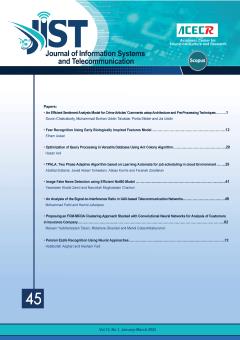Nowadays, with the advancement of database information technology, databases has led to large-scale distributed databases. According to this study, database management systems are improved and optimized so that they provide responses to customer questions with lower co
More
Nowadays, with the advancement of database information technology, databases has led to large-scale distributed databases. According to this study, database management systems are improved and optimized so that they provide responses to customer questions with lower cost. Query processing in database management systems is one of the important topics that grabs attentions. Until now, many techniques have been implemented for query processing in database system. The purpose of these methods is to optimize query processing in the database. The main topics that is interested in query processing in the database makes run-time adjustments of processing or summarizing topics by using the new approaches. The aim of this research is to optimize processing in the database by using adaptive methods. Ant Colony Algorithm (ACO) is used for solving optimization problems. ACO relies on the created pheromone to select the optimal solution. In this article, in order to make adaptive hybrid query processing. The proposed algorithm is fundamentally divided into three parts: separator, replacement policy, and query similarity detector. In order to improve the optimization and frequent adaption and correct selection in queries, the Ant Colony Algorithm has been applied in this research. In this algorithm, based on Versatility (adaptability) scheduling, Queries sent to the database have been attempted be collected. The simulation results of this method demonstrate that reduce spending time in the database. According to the proposed algorithm, one of the advantages of this method is to identify frequent queries in high traffic times and minimize the time and the execution time. This optimization method reduces the system load during high traffic load times for adaptive query Processing and generally reduces the execution runtime and aiming to minimize cost. The rate of reduction of query cost in the database with this method is 2.7%. Due to the versatility of high-cost queries, this improvement is manifested in high traffic times. In the future Studies, by adapting new system development methods, distributed databases can be optimized.
Manuscript profile


